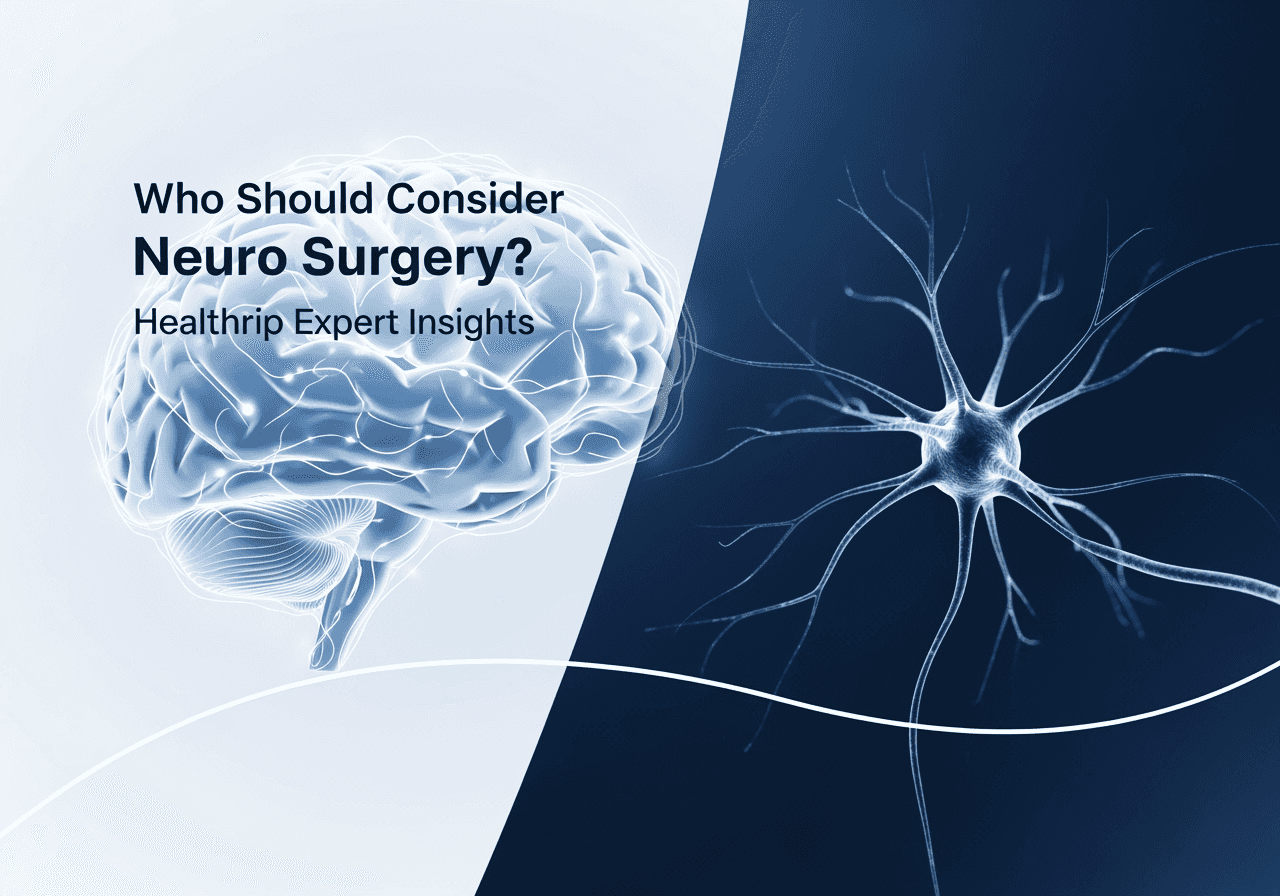
Who Should Consider Neuro Surgery? Healthtrip Expert Insights
14 Oct, 2025
 Healthtrip
Healthtrip- Who Needs Neuro Surgery? Identifying Potential Candidates < li>Why Neuro Surgery Might Be Necessary: Common Conditions & Scenarios
- Where to Find Top Neurosurgeons: Renowned Hospitals & Centers
- Memorial Sisli Hospital
- Vejthani Hospital
- Fortis Memorial Research Institute, Gurgaon
< li>How Neuro Surgery Works: An Overview of Procedures & Techniques - Real-Life Examples: Neuro Surgery Success Stories & Patient Journeys
- The Benefits and Risks of Neuro Surgery: Weighing Your Options
- Conclusion: Making an Informed Decision About Neuro Surgery
Understanding Neurosurgery: More Than Just Brain Surgery
Neurosurgery encompasses a broad range of procedures addressing disorders of the brain, spinal cord, peripheral nerves, and cerebrovascular system. While the image of brain surgery might be the first to come to mind, it's important to realize that neurosurgeons also treat conditions like spinal stenosis, herniated discs, carpal tunnel syndrome, and nerve damage due to injury. Think of it as the field dedicated to restoring and optimizing the function of your entire nervous system – your body's intricate communication network. Neurosurgery isn't always about invasive procedures; many neurosurgeons also specialize in minimally invasive techniques that can offer quicker recovery times and reduced risks. So, before you conjure up images of lengthy hospital stays, it's essential to understand the full scope of what neurosurgery entails and how it could potentially improve your overall well-being. Facilities like Memorial Sisli Hospital and NMC Specialty Hospital, Al Nahda, Dubai offer advanced neurosurgical options. Remember, taking control of your health begins with gathering information and exploring all available avenues.
Most popular procedures in India
Common Conditions That May Require Neurosurgical Intervention
Several conditions might warrant a visit to a neurosurgeon. Chronic back pain caused by a herniated disc or spinal stenosis, which hasn't responded to conservative treatments like physical therapy or medication, could be a sign. Similarly, persistent headaches, seizures, or other neurological symptoms may indicate a need for further investigation, potentially leading to surgical intervention. Traumatic brain injuries from accidents, strokes impacting brain function, or tumors affecting the brain or spinal cord often require the expertise of a neurosurgeon. Furthermore, conditions like hydrocephalus (fluid buildup in the brain) or trigeminal neuralgia (severe facial pain) are frequently managed surgically. It's important to note that not every case necessarily results in surgery; a neurosurgeon will thoroughly evaluate your condition, review your medical history, and recommend the most appropriate treatment plan, tailored to your specific needs. Hospitals like Bangkok Hospital and Saudi German Hospital Cairo, Egypt have specialized neurosurgery departments equipped to handle complex cases; it's about finding the best fit for your individual health journey.
Wellness Treatments
Give yourself the time to relax
Lowest Prices Guaranteed!

Lowest Prices Guaranteed!
When Should You Consider Seeing a Neurosurgeon?
Knowing when to seek a neurosurgical consultation can be tricky, but as a general rule, if you're experiencing persistent neurological symptoms that significantly impact your daily life, it's worth considering. This includes unrelenting pain, weakness, numbness, tingling, changes in vision, difficulty with balance or coordination, or cognitive issues. If these symptoms haven't improved with other treatments or are progressively worsening, a neurosurgeon can provide a comprehensive evaluation and explore potential solutions. Don't wait until your symptoms become unbearable – early diagnosis and intervention often lead to better outcomes. Remember, consulting a neurosurgeon doesn't automatically mean you need surgery, it simply means exploring all available options. Healthtrip can help you find experienced neurosurgeons at leading hospitals like LIV Hospital, Istanbul, and Singapore General Hospital, giving you access to world-class care and expert opinions. It's always better to be proactive when it comes to your health.
The Neurosurgical Evaluation Process
So, you’ve decided to see a neurosurgeon – what can you expect during the evaluation? First, the neurosurgeon will take a detailed medical history, discussing your symptoms, past illnesses, and any medications you're currently taking. A thorough neurological examination will follow, assessing your reflexes, muscle strength, sensation, coordination, and mental status. Based on the initial assessment, the neurosurgeon may order imaging tests like MRI, CT scans, or X-rays to get a clearer picture of your brain, spinal cord, or nerves. Electromyography (EMG) and nerve conduction studies might also be used to evaluate nerve function. Once all the information is gathered, the neurosurgeon will discuss the findings with you, explain the potential causes of your symptoms, and outline treatment options. This is your opportunity to ask questions, express concerns, and actively participate in the decision-making process. Hospitals like Fortis Memorial Research Institute, Gurgaon, and Helios Klinikum Erfurt utilize advanced diagnostic tools to ensure accurate assessments. Remember, open communication is key to building a strong doctor-patient relationship and achieving the best possible outcome.
What Treatment Options Are Available?
Neurosurgical treatment options are diverse and tailored to each patient's specific condition. Depending on the diagnosis, treatment plans may range from conservative management to complex surgical procedures. Conservative approaches can include medication to manage pain or inflammation, physical therapy to improve strength and flexibility, and lifestyle modifications. When surgery is necessary, neurosurgeons may utilize minimally invasive techniques, such as endoscopic surgery or stereotactic radiosurgery, which involve smaller incisions, less pain, and faster recovery times. Traditional open surgery may be required for more complex cases, such as tumor removal or spinal fusion. Neurosurgeons also perform procedures to relieve pressure on nerves, repair damaged blood vessels, or implant devices to manage pain or control seizures. Whether you choose Mount Elizabeth Hospital or Quironsalud Hospital Murcia, rest assured that modern neurosurgery offers a wide spectrum of treatment possibilities, and the best approach will be determined in consultation with your neurosurgeon, considering your individual needs and preferences. Healthtrip facilitates access to these advanced treatment options at globally recognized facilities.
Who Needs Neuro Surgery? Identifying Potential Candidates
Neuro surgery, often perceived as a daunting prospect, is actually a life-saving intervention for numerous conditions affecting the brain, spinal cord, and peripheral nerves. But how do you know if you or a loved one might be a candidate? It's not simply a matter of headaches or back pain, although those can sometimes be symptoms. Instead, neurosurgical intervention becomes a consideration when neurological conditions significantly impact your quality of life, causing persistent pain, impaired movement, or cognitive dysfunction. Think about those moments when the simplest tasks become monumental challenges – struggling to walk without assistance, experiencing debilitating migraines that refuse to respond to medication, or noticing a gradual decline in memory and concentration. These are the kinds of red flags that warrant a thorough neurological evaluation. Identifying potential candidates involves a multi-faceted approach. Neurologists, using advanced diagnostic tools like MRI and CT scans, meticulously assess the nervous system's structure and function. They look for abnormalities like tumors, aneurysms, herniated discs, or nerve compression. It's like being a detective, piecing together clues from medical history, physical examinations, and imaging results to arrive at an accurate diagnosis. At Healthtrip, we understand that navigating this process can be overwhelming. That’s why we connect you with experienced neurologists who can provide comprehensive evaluations and determine if neurosurgery is the appropriate course of action. We believe in empowering you with the information you need to make informed decisions about your health, ensuring you feel supported every step of the way. After all, your well-being is our top priority, and we're here to guide you on your journey to recovery.
Neurological conditions are complex, and what might seem like a minor issue can sometimes indicate a more serious underlying problem. Furthermore, the decision to pursue neurosurgery is never taken lightly. It involves a careful consideration of the potential benefits and risks, as well as a discussion of alternative treatment options. For example, someone experiencing chronic back pain due to a herniated disc might initially benefit from physical therapy, pain medication, or minimally invasive procedures. However, if these conservative approaches fail to provide adequate relief, and the pain continues to interfere with daily activities, neurosurgery might be considered to remove the pressure on the nerve. Similarly, patients diagnosed with brain tumors require careful evaluation to determine the tumor’s size, location, and growth rate. Depending on these factors, neurosurgery, radiation therapy, or chemotherapy might be recommended. The key is to personalize the treatment plan to address the individual patient’s specific needs and circumstances. Healthtrip facilitates access to world-class medical facilities and expert neurosurgeons who specialize in various neurological conditions. Whether you're seeking a second opinion, exploring treatment options, or preparing for surgery, we provide the resources and support you need to make informed decisions. We are committed to bridging the gap between patients and quality healthcare, ensuring you receive the best possible care tailored to your unique situation. Because when it comes to your health, you deserve nothing less than excellence.
Why Neuro Surgery Might Be Necessary: Common Conditions & Scenarios
Neuro surgery isn't just a last resort; it's often a crucial intervention that can dramatically improve the lives of individuals facing a range of debilitating neurological conditions. From relieving chronic pain to restoring lost function, neurosurgery addresses problems that often can’t be adequately managed with medication or other non-invasive treatments. Consider, for instance, the case of a spinal cord injury resulting from an accident. In these situations, neurosurgical intervention might be necessary to stabilize the spine, decompress the spinal cord, and prevent further neurological damage. Or imagine someone diagnosed with a brain aneurysm – a weakened blood vessel in the brain that’s at risk of rupturing. Neuro surgery can repair the aneurysm, preventing a potentially life-threatening hemorrhage. These are just a couple of examples of how neurosurgery can be essential for preserving life and restoring neurological function.
One of the most common reasons for neuro surgical intervention is the presence of tumors in the brain or spinal cord. These tumors can be benign (non-cancerous) or malignant (cancerous), and they can cause a variety of symptoms depending on their size, location, and growth rate. Symptoms might include headaches, seizures, vision problems, weakness, or cognitive changes. Neuro surgery aims to remove as much of the tumor as possible while minimizing damage to surrounding healthy tissue. For example, hospitals like Saudi German Hospital Cairo and Fortis Memorial Research Institute, Gurgaon have dedicated neurosurgery units and utilize advanced technologies like intraoperative MRI and minimally invasive techniques to achieve the best possible outcomes for their patients. Another frequently encountered condition is herniated discs in the spine. These occur when the soft, gel-like center of a spinal disc pushes through the tough outer layer, compressing nearby nerves and causing pain, numbness, or weakness in the arms or legs. While many cases of herniated discs can be managed with conservative treatments, neuro surgery might be necessary if the symptoms are severe or persistent. Procedures like microdiscectomy involve removing the portion of the disc that’s pressing on the nerve, providing significant pain relief and restoring function. Healthtrip partners with leading hospitals that specialize in managing herniated discs and other spinal conditions, ensuring you have access to the latest treatment options and expert care. We aim to simplify the process of finding the right neurosurgeon and medical facility, allowing you to focus on your recovery. Because getting the right treatment is non-negotiable, neuro surgery is sometimes the only path to restoring a patient's quality of life and alleviating pain and discomfort.
Where to Find Top Neurosurgeons: Renowned Hospitals & Centers
Finding the right neurosurgeon and medical facility can feel like navigating a maze, especially when you're already dealing with a complex health condition. The good news is that there are numerous renowned hospitals and centers around the world that specialize in neurosurgery, offering cutting-edge technology and highly skilled medical professionals. It's about finding the best fit for your specific needs and circumstances, and that starts with knowing where to look. When searching for top neurosurgeons, consider factors such as their experience, specialization, and the hospital's reputation for excellence in neurological care. Look for hospitals that have dedicated neurosurgery departments with state-of-the-art equipment and a multidisciplinary approach to patient care. This means that neurosurgeons work closely with neurologists, radiologists, oncologists, and other specialists to develop comprehensive treatment plans tailored to each individual patient.
For those seeking world-class neurosurgical care, several hospitals stand out for their expertise and innovation. Memorial Sisli Hospital in Istanbul, Turkey, is renowned for its advanced neurosurgery department and its commitment to providing patient-centered care. The hospital boasts a team of highly experienced neurosurgeons who specialize in various areas, including brain tumor surgery, spinal surgery, and vascular neurosurgery. They utilize cutting-edge technology like intraoperative MRI, neuronavigation, and minimally invasive techniques to ensure the best possible outcomes for their patients. The hospital's commitment to quality and patient safety has earned it international accreditation, making it a trusted destination for medical tourists seeking neurosurgical care. In Bangkok, Thailand, Vejthani Hospital is another leading center for neurosurgery. Known for its comprehensive neurological services and patient-friendly environment, Vejthani attracts patients from around the globe. The hospital's neurosurgery team is highly skilled in performing complex procedures, including brain tumor removal, spinal fusion, and deep brain stimulation. They also offer advanced diagnostic imaging services, such as 3T MRI and CT angiography, to accurately diagnose and plan treatment for neurological conditions. In India, Fortis Memorial Research Institute, Gurgaon, is a leading healthcare provider with a strong focus on neurosciences. The hospital's neurosurgery department is equipped with the latest technology and staffed by a team of experienced neurosurgeons who are experts in their respective fields. Fortis Memorial Research Institute offers a wide range of neurosurgical procedures, including minimally invasive spine surgery, brain tumor surgery, and vascular neurosurgery. They also have a dedicated neurorehabilitation unit to help patients recover and regain function after surgery. These are just a few examples of the many excellent hospitals and centers around the world that offer exceptional neurosurgical care. Healthtrip can help you connect with these and other leading medical facilities, providing you with the information and support you need to make an informed decision about your treatment. Our goal is to make the process of finding the right neurosurgeon as seamless and stress-free as possible, so you can focus on your health and well-being.
Also Read:
How Neuro Surgery Works: An Overview of Procedures & Techniques
Neuro surgery, at its core, is about restoring and improving the function of the nervous system. It's a field that demands incredible precision, advanced technology, and a deep understanding of the intricacies of the brain, spinal cord, and peripheral nerves. Thinking about neurosurgery can feel daunting, but understanding the range of procedures available can often ease anxieties. From minimally invasive techniques to complex open surgeries, neurosurgeons have a vast arsenal of tools and expertise to address a wide array of conditions. The choice of procedure depends entirely on the specific diagnosis, the location of the problem, and the overall health of the patient. Imagine the nervous system as an intricate network of roads – neurosurgery aims to repair damage, remove obstacles, and ensure smooth traffic flow. Healthtrip can help you navigate this complex world, connecting you with leading neurosurgeons and facilitating second opinions to ensure you feel confident in your treatment plan.
Minimally invasive techniques have revolutionized neurosurgery, allowing surgeons to access and treat certain conditions through small incisions. Endoscopic surgery, for example, utilizes tiny cameras and specialized instruments to navigate through natural openings or small incisions, minimizing tissue damage and recovery time. Stereotactic surgery employs advanced imaging and computer-guided technology to precisely target specific areas within the brain, enabling surgeons to perform biopsies, deliver targeted therapies, or implant electrodes with remarkable accuracy. These techniques offer significant benefits, including reduced pain, shorter hospital stays, and faster return to normal activities. However, not all conditions are suitable for minimally invasive approaches. Complex cases may require traditional open surgery to provide the surgeon with the necessary visualization and access. Regardless of the technique employed, the goal remains the same – to alleviate symptoms, improve neurological function, and enhance the patient's quality of life. Healthtrip understands the importance of personalized care and will work with you to find the best neurosurgical solution for your unique needs, coordinating everything from initial consultations to post-operative care.
Advanced technologies play a crucial role in modern neurosurgery. Intraoperative MRI (iMRI) provides real-time imaging during surgery, allowing surgeons to visualize the brain and spinal cord with exceptional clarity and precision. This technology helps ensure complete tumor removal and minimizes damage to surrounding healthy tissue. Neuro-navigation systems use pre-operative imaging to create a virtual roadmap of the patient's brain, guiding the surgeon's instruments with pinpoint accuracy. Robotic-assisted surgery offers enhanced dexterity and precision, particularly in complex spinal procedures. And let's not forget the power of neuromonitoring, which tracks the function of vital nerves and brain structures during surgery, helping to prevent neurological deficits. All of these advancements translate to safer, more effective neurosurgical outcomes. At Healthtrip, we recognize that access to cutting-edge technology can significantly impact your treatment journey. We partner with hospitals and clinics that offer the latest neurosurgical advancements, ensuring you have access to the best possible care. We can help you understand the available technologies and how they might benefit your specific case, empowering you to make informed decisions about your health.
Real-Life Examples: Neuro Surgery Success Stories & Patient Journeys
Hearing first-hand accounts of successful neurosurgery can be incredibly reassuring. Consider the story of a patient diagnosed with a complex brain tumor, a meningioma pressing against vital structures. The patient was understandably anxious, facing a surgery that could potentially impact speech, movement, and cognitive function. After consulting with a neurosurgeon facilitated through Healthtrip, the patient felt empowered. The Healthtrip team helped coordinate virtual consultations so that the patient got a clear picture of all the pros and cons involved in the procedure, thereby making them feel comfortable about choosing to undergo the surgery at Memorial Sisli Hospital, in Istanbul. Using intraoperative MRI, the surgeon was able to meticulously remove the tumor while preserving critical brain function. Post-surgery, the patient experienced a remarkable recovery, regaining full function and resuming normal life. This story highlights the transformative potential of neurosurgery, especially when coupled with expert care and advanced technology.
Spinal surgery offers numerous success stories. Many individuals suffer from chronic back pain due to herniated discs, spinal stenosis, or other degenerative conditions. These conditions can significantly impact mobility, quality of life, and overall well-being. Consider the case of a patient who suffered from debilitating back pain for years, preventing them from working, exercising, or even enjoying simple activities. After undergoing spinal fusion surgery at Vejthani Hospital with the help of Healthtrip, the patient experienced significant pain relief and regained their mobility. They were able to return to work, resume their favorite hobbies, and rediscover the joys of an active life. These success stories underscore the power of neurosurgery to alleviate pain, restore function, and improve the lives of countless individuals. Real-life examples truly do inspire hope.
For children facing neurological challenges, neurosurgery can be life-saving. Imagine a child diagnosed with hydrocephalus, a condition characterized by excessive fluid buildup in the brain. Without treatment, hydrocephalus can lead to developmental delays, neurological damage, and even death. Neurosurgical intervention, such as the placement of a shunt to drain excess fluid, can dramatically improve the child's prognosis. Healthtrip understands the unique challenges faced by families navigating pediatric neurosurgery. We can connect you with leading pediatric neurosurgeons and provide comprehensive support throughout the entire treatment journey, offering emotional support, practical assistance, and guidance on navigating the healthcare system. Sharing real-life success stories can offer comfort and hope to families facing similar situations, reminding them that positive outcomes are possible and that they are not alone. Hearing from other parents and families can be a source of strength and inspiration during what can be a very challenging time. Healthtrip's goal is to support you every step of the way.
Also Read:
The Benefits and Risks of Neuro Surgery: Weighing Your Options
Like any medical procedure, neurosurgery involves both potential benefits and risks. A frank and open discussion with your neurosurgeon is crucial to fully understand what to expect. The benefits can be life-changing, from alleviating chronic pain and restoring mobility to preventing neurological damage and improving cognitive function. For individuals suffering from debilitating conditions, neurosurgery can offer a pathway to a better quality of life. However, it's essential to acknowledge that neurosurgery carries inherent risks, including infection, bleeding, blood clots, nerve damage, and anesthesia complications. The specific risks vary depending on the type of surgery, the patient's overall health, and the surgeon's experience. Healthtrip believes in empowering patients to make informed decisions. We can help you find qualified neurosurgeons who will thoroughly explain the potential benefits and risks of your proposed procedure, discuss alternative treatment options, and answer all your questions with honesty and transparency.
One of the key things to remember is that neurosurgery is never undertaken lightly. It’s a decision that is arrived at after careful consideration of all other options. Often, less invasive treatments like medication, physical therapy, or injections are tried first. But when these approaches fail to provide adequate relief or when the condition poses a significant threat to neurological function, neurosurgery may be the most appropriate course of action. It’s also important to get a second opinion. Different neurosurgeons may have different approaches or perspectives, and getting multiple viewpoints can help you feel more confident in your treatment plan. Healthtrip facilitates these second opinions from leading experts around the globe, ensuring you have the information you need to make the right choice for your unique situation. We understand that navigating the complexities of neurosurgery can be overwhelming, and we are here to provide guidance and support every step of the way.
Ultimately, the decision to undergo neurosurgery is a personal one. It's about weighing the potential benefits against the risks and considering your individual circumstances, values, and preferences. It is crucial that patients are realistic about the outcome that they expect from the surgery. It is also important that they have a clear understanding of the recovery process. For example, patients should know if their lifestyle will be impacted post-surgery. Healthtrip’s mission is to ensure that you have all the information and resources you need to make an informed decision that aligns with your goals. We can connect you with support groups, patient advocates, and other resources to help you navigate the emotional and practical challenges of neurosurgery. Our team is dedicated to providing compassionate care and personalized support, empowering you to take control of your health and well-being. We believe that everyone deserves access to the best possible neurosurgical care, and we are here to help you find it.
Conclusion: Making an Informed Decision About Neuro Surgery
Navigating the world of neurosurgery can feel like traversing a complex maze. From understanding the intricacies of the nervous system to weighing the benefits and risks of various procedures, it's a journey that requires careful consideration and expert guidance. The key to making an informed decision about neurosurgery lies in education, communication, and access to reliable information. By understanding your condition, exploring your treatment options, and consulting with experienced neurosurgeons, you can empower yourself to choose the path that best aligns with your individual needs and goals. Healthtrip is here to be your trusted partner along the way.
Healthtrip’s goal is to bridge the gap between patients seeking neurosurgical care and the world's leading medical experts and facilities. We understand that choosing a neurosurgeon and a hospital can be a daunting task, especially when you're dealing with complex medical conditions. That's why we offer a comprehensive suite of services to simplify the process, from connecting you with qualified neurosurgeons to coordinating consultations, arranging travel logistics, and providing ongoing support throughout your treatment journey. Whether you're seeking a second opinion, exploring minimally invasive techniques, or considering complex spinal surgery, Healthtrip is here to help, we can assist you at hospitals such as Fortis Memorial Research Institute, Gurgaon, Vejthani Hospital and Memorial Sisli Hospital.
Ultimately, neurosurgery is about restoring hope and improving lives. It's about alleviating pain, restoring function, and empowering individuals to live their lives to the fullest. While the decision to undergo neurosurgery is a personal one, it's a decision that should be made with confidence, knowledge, and the support of a trusted healthcare team. Healthtrip is committed to providing you with the resources, information, and support you need to navigate the complexities of neurosurgery and make informed decisions about your health. We're here to help you every step of the way, from initial consultation to post-operative care, ensuring you receive the best possible care and achieve the best possible outcome. Trust Healthtrip to guide you through this journey, providing you with the personalized care and support you deserve, helping you reclaim your health and well-being.
Also Read:
Related Blogs

Healthtrip's Care Coordinators: Your Support During Cancer Treatment
Detailed guide on cancer treatment, featuring doctors, hospitals, risks, recovery,

Top 5 Indian Hospitals for Cancer Treatment
Detailed guide on cancer treatment, featuring doctors, hospitals, risks, recovery,

Post-Cancer Treatment Diet and Lifestyle Tips
Detailed guide on cancer treatment, featuring doctors, hospitals, risks, recovery,

Common Risks in Cancer Treatment and How Healthtrip Manages Them
Detailed guide on cancer treatment, featuring doctors, hospitals, risks, recovery,

Is Cancer Treatment Right for You? Healthtrip Explains Evaluation Steps
Detailed guide on cancer treatment, featuring doctors, hospitals, risks, recovery,

Role of Multidisciplinary Teams in Cancer Treatment
Detailed guide on cancer treatment, featuring doctors, hospitals, risks, recovery,










